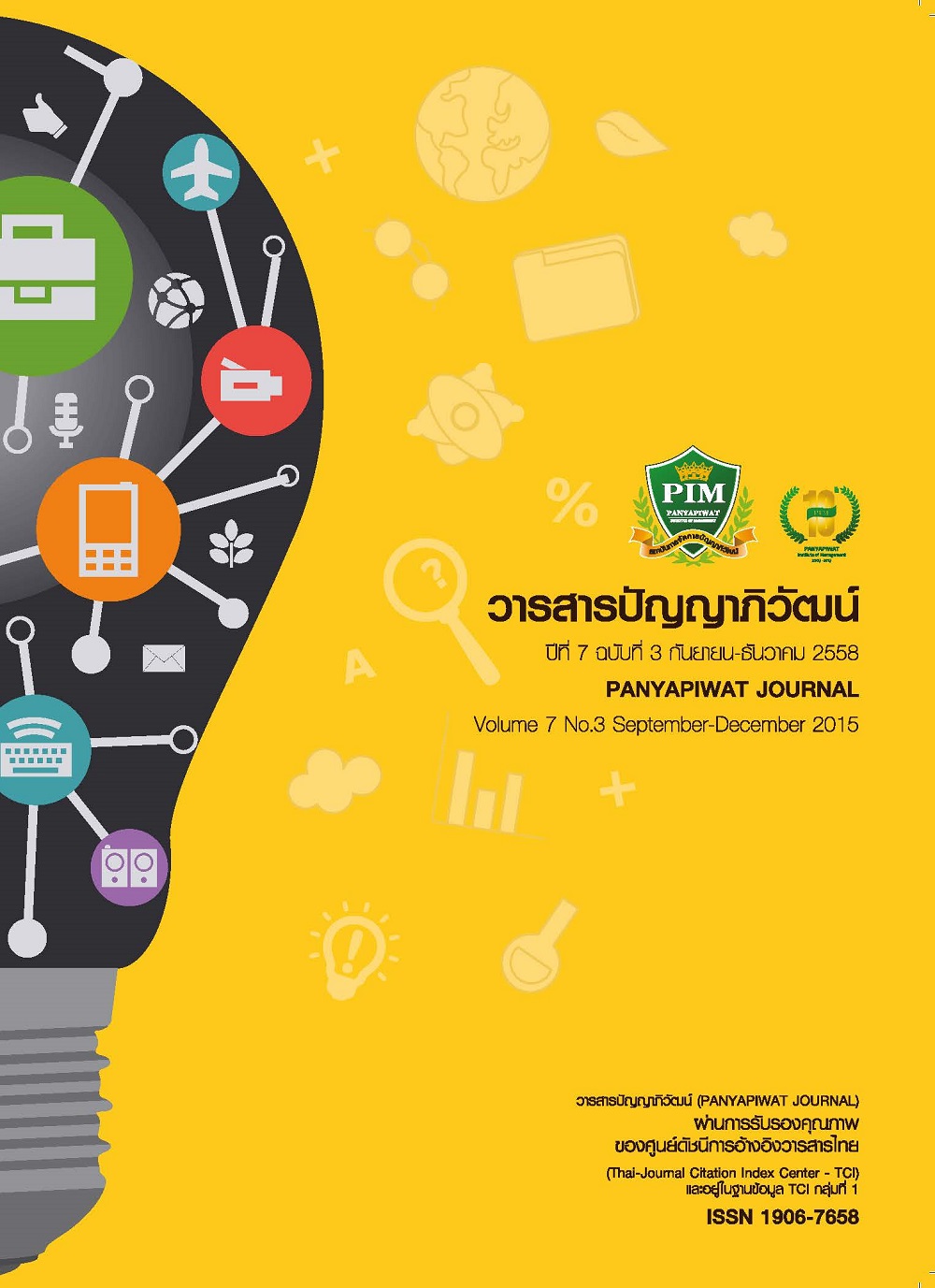วัฒนธรรมผู้แทนขาย จริยธรรมผู้แทนขาย และการตลาดสัมพันธ์ที่มีผลต่อคุณภาพความสัมพันธ์ของลูกค้าอุปกรณ์เครื่องมือการแพทย์
Main Article Content
บทคัดย่อ
การวิจัยนี้มีวัตถุประสงค์เพื่อศึกษาวิเคราะห์ความสัมพันธ์ของวัฒนธรรมผู้แทนขาย จริยธรรมผู้แทนขาย และการตลาดสัมพันธ์ ที่มีผลต่อคุณภาพความสัมพันธ์กับลูกค้าอุปกรณ์เครื่องมือการแพทย์ในประเทศไทย ตัวอย่างที่ใช้ในการวิจัยครั้งนี้ คือ ลูกค้าอุปกรณ์เครื่องมือแพทย์จำนวน 290 คน และผู้แทนขายอุปกรณ์เครื่องมือการแพทย์ จำนวน 290 คน รวมเป็น 580 คน เครื่องมือที่ใช้ในการวิจัยเป็นแบบสอบถามเก็บรวบรวมข้อมูลโดยการเก็บแบบสอบถาม การวิเคราะห์ข้อมูลและการพัฒนาตัวแบบใช้ทั้งสถิติพื้นฐานและการวิเคราะห์สมการโครงสร้างด้วยโปรแกรมสำเร็จรูป
ผลการศึกษาพบว่า จริยธรรมผู้แทนขายและการตลาดสัมพันธ์มีความสัมพันธ์ทางตรงในเชิงบวกต่อคุณภาพความสัมพันธ์ ผลการทดสอบสมมติฐาน พบว่า เป็นไปตามสมมติฐานของการวิจัย คือ ตัวแปรแฝงตลาดสัมพันธ์มีความสัมพันธ์ทางตรงในเชิงบวกต่อคุณภาพความสัมพันธ์อย่างมีนัยสำคัญทางสถิติที่ระดับ 0.05 ส่วนวัฒนธรรมผู้แทนขายมีความสัมพันธ์ทางตรงในเชิงบวกต่อคุณภาพความสัมพันธ์ ผลการทดสอบสมมติฐาน พบว่า ไม่เป็นไปตามสมมติฐานของการวิจัย คือ ตัวแปรแฝงวัฒนธรรมผู้แทนขายไม่มีความสัมพันธ์ทางตรงต่อคุณภาพความสัมพันธ์
การวิเคราะห์แบบจำลองสมการโครงสร้างวัฒนธรรมผู้แทนขาย จริยธรรมผู้แทนขายที่มีผลต่อคุณภาพความสัมพันธ์กับลูกค้าอุปกรณ์เครื่องมือการแพทย์ พบว่า ค่าความน่าจะเป็นของไคสแควร์ (chi-square probability level) น้อยกว่า .05 แสดงว่า โมเดลต้นแบบไม่สอดคล้องกับข้อมูลเชิงประจักษ์ แตกต่างกันอย่างมีนัยสำคัญทางสถิติ ค่าไคสแควร์สัมพัทธ์ (CMIN/DF) เท่ากับ 2.583 ค่าดัชนีวัดระดับความสอดคล้อง (GFI) เท่ากับ .928 และค่าดัชนีรากของค่าเฉลี่ยกำลังสองของการประมาณค่าความคลาดเคลื่อน (RMSEA) เท่ากับ .052 จึงสรุปได้ว่า ตัวแบบจำลองสมการโครงสร้างวัฒนธรรม จริยธรรมผู้แทนขายที่มีผลต่อคุณภาพความสัมพันธ์กับลูกค้าอุปกรณ์เครื่องมือการแพทย์ มีความสอดคล้องกลมกลืนกับข้อมูลเชิงประจักษ์
The study aims to study the relationship of culture that affect sales representatives to analyze the relationship quality and relationship marketing relationships affect the quality of relationships with customers in medical equipment. The sample unit used in this research was 290 physicians and 290 medical device sales representatives for a total of 580, The research method were questionnaire. The data analysis applied a processing program for statistics.
The research results showed that ethical sales representative that affected the quality of customer relationship in medical equipment. Result of this study showed that the hypothesis of the research is latent relationship marketing relation direct positive relationship quality. Statistically significant at the 0.05 level of cultural relations, direct sales representatives positive relationship quality. Test the hypothesis that do not meet the assumptions of the study are latent cultural relations, direct sales representatives do not have the quality of a relationship.
The structural equation model analysis of ethics affected sales representatives and customer relationships found that the probability of the chi-square (chi-square probability level) was less than .05 indicating that the underlying model was not consistent with empirical data of chi -square relative (CMIN / DF) equal to 2.583, the index measures the consistency (GFI) was .928, and the index of the root mean square error of approximation (RMSEA) was .052. The model was concluded that all three statistical criteria for assessing the structural equation was suitable with the empirical data.
Article Details
“ข้าพเจ้าและผู้เขียนร่วม (ถ้ามี) ขอรับรองว่า บทความที่เสนอมานี้ยังไม่เคยได้รับการตีพิมพ์และไม่ได้อยู่ระหว่างกระบวนการพิจารณาลงตีพิมพ์ในวารสารหรือแหล่งเผยแพร่อื่นใด ข้าพเจ้าและผู้เขียนร่วมยอมรับหลักเกณฑ์การพิจารณาต้นฉบับ ทั้งยินยอมให้กองบรรณาธิการมีสิทธิ์พิจารณาและตรวจแก้ต้นฉบับได้ตามที่เห็นสมควร พร้อมนี้ขอมอบลิขสิทธิ์บทความที่ได้รับการตีพิมพ์ให้แก่สถาบันการจัดการปัญญาภิวัฒน์หากมีการฟ้องร้องเรื่องการละเมิดลิขสิทธิ์เกี่ยวกับภาพ กราฟ ข้อความส่วนใดส่วนหนึ่งและ/หรือข้อคิดเห็นที่ปรากฏในบทความข้าพเจ้าและผู้เขียนร่วมยินยอมรับผิดชอบแต่เพียงฝ่ายเดียว”
เอกสารอ้างอิง
กระทรวงศึกษาธิการ. (2550), คุณธรรมพื้นฐาน 8 ประการ. สืบค้นเมื่อ 29 มิถุนายน 2556, จาก http//www.moe.go.th
สํานักนโยบายและยุทธศาสตร์ สํานักงานปลัดกระทรวงสาธารณสุข. (2552). ข้อมูลทั่วไปเกี่ยวกับสถานพยาบาล. สืบค้นเมื่อ 29 มิถุนายน 2556, จาก http://bbs.ops.moph.go.th
Arbuckle, J. L. (2011). IBM SPSS Amos 20 User's Guide. New York: Amos Development Corporation.
Bansal, H. S., Taylor, S. F. & James, Y. (2005). 'Migrating' to new service providers: toward a unifying
framework of consumers' switching behaviors. Journal of the Academy of Marketing Science,
(1), 96-115.
Beekun, R. I., Stedham, Y., Yamamura J. H. & Barghouti, J. A. (2003). Comparing business ethics in
Russia and the US. International Journal of Human Resource Management, 14(8), 1333-1349.
Belz, C. & Schmitz, C. (2007). Womit Verkäuferzukämpfenhaben. In: B2B Excellence Letter 6, 9-13.
Bitner, M. J. (1992). "Servicescapes: the impact of physical surroundings on customers and
employees”. Journal of Marketing, 56(2), 57-71.
Čater, T. & Čater, B. (2010). Product and relationship quality influence on customer commitment
and loyalty in B2B manufacturing relationships. Industrial Marketing Management, 39(8), 1321-1333.
Curtis, T. (2009). Customer Satisfaction, Loyalty, and Repurchase: Meta-Analytical Review, and Theoretical and Empirical Evidence of Loyalty and Repurchase Differences (Doctoral dissertation). Pro Quest Dissertations and Theses database. (UMI No. 3390443).
De Wulf, K., Oderkerken-Schroder, G. & lacobucci, D. (2001). Investment in Across-country and cross-industry exploration. Journal of Marketing, 65, 33-50.
Diamantopoulos, A. & Siguaw, J. A. (2000). Introducing LISREL. London: Sage Publications.
Fraedrich, J., Cherry, J., King, J. & Guo, C. (2005). An empirical investigation of the effects of business ethics training. Marketing Education Review, 15(3), 27-36.
Hansen, J. D. & Riggle, R. J. (2009). Ethical salesperson behavior in sales relationships. Journal of Personal Selling & Sales Management, 29(2), 151-166.
Kumar, M., Kee, F. T. & Manshor, A. T. (2009). Determining the relative importance of critical factors in delivering service quality of banks: an application of dominance analysis in SERVQUAL model. Managing service quality: An International Journal, 19(2), 211-228.
Peng, L. Y. & Wang, Q. (2006). Impact of Relationship Marketing Tactics (RMT) on Switchers and Stayers in a Competitive Service Industry. Journal of Marketing Management, 22(1), 25-59.
Rauyruen, P., Miller, K. E. & Barrett, N. J. (2007). Relationship Quality as a Predictor of B2B Customer Loyalty. Journal of Business Research, 60(1), 21-32.
Román, S. & Ruiz, S. (2005). Relationship outcomes of perceived ethical sales behavior: the customers perspective. Journal of Business Research, 58(4), 439-445.
Rust, R. T. & Zahoriki, A. (1993) Customer satisfaction, customer retention and market share. Journal of Retailing, 69(2), 193-215.
Veloutsou, C., Saren, M. & Tzokas, N. (2002). Relationship Marketing: What If...?. European Journal
of Marketing, 36(4), 433-49.
Wilson, L. (1993). The quality Measure is Customer Opinion. Journal for Quality & Participation,12-13.
Translated Thai References
Bureau of Policy and Strategy. (2013). General information of nursing home. Retrieved June 29,2013, from http://bps.ops.moph.go.th [in Thai]
Ministry of Education. (2007). The basis moral of 8 level. Retrieved June 29, 2013, from http://www.moe.go.th [in Thai]


